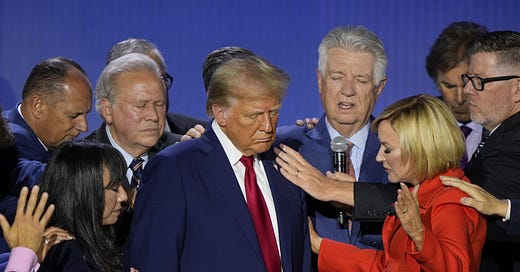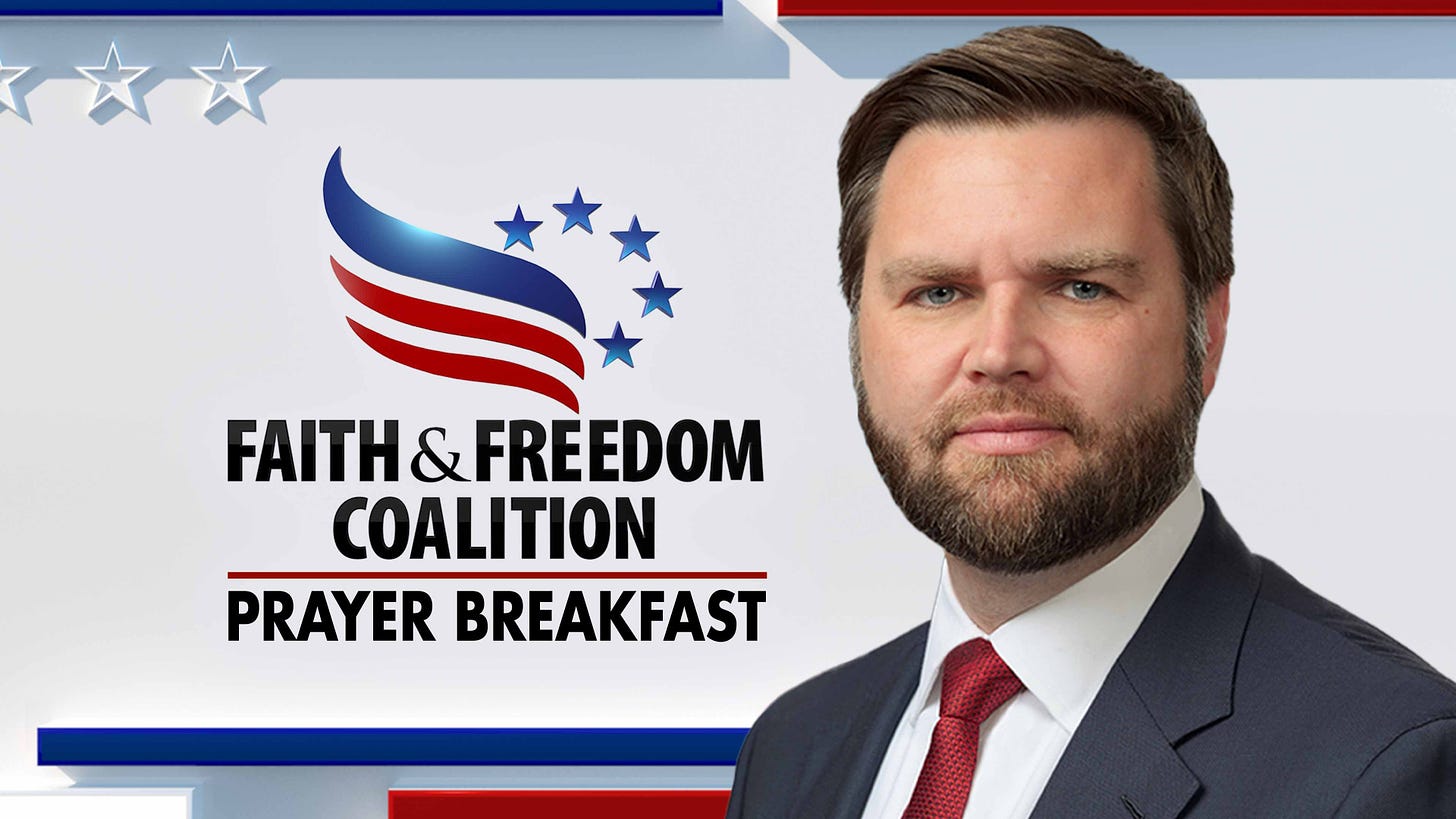I want to talk about another aspect of Trump’s victory: the fact Christians voted for Trump by a landslide, favouring him over Harris by two to one. I’m fascinated by this for three reasons.
First, because it’s part of a growing trend. Whether you’re religious or not, whether you live in America or elsewhere, conservative Christians are a playing a growing role in shaping our shared future - and pushing it in more authoritarian directions.
Second, more personally, because I’m a Christian, and to me, leaders like Trump stand for the opposite of what I understand Christianity to be about: values like kindness, wisdom, looking out for the vulnerable, looking out for the planet, and the common good.
This then leads to the third thing: that I’m left wondering whether I do actually have ‘more in common than that which divides us’ with conservative Christians. And if not, then where does that leave me - given that I run an organisation that’s supposed to be all about bridging political divides?
Two tribes don’t go to war
Let’s start by unpacking whom we mean when we say ‘the Christian right’ in America - which is really an alliance between two tribes.
One is white evangelical Protestants, 81% of whom voted for Trump. They’ve been a political force in the US for a long time but achieved their breakthrough in the late 1970s through the effort of leaders like Jerry Falwell and organisations like the Moral Majority and Focus on the Family. They then became increasingly influential in the Republican Party under Reagan, saw one of their own elected in George W Bush, and have now seen their influence in the GOP reach an all time high.
The other is a broader, more diverse cohort of people who have converted to Christianity more recently, having come to it via the culture wars - a group explored in depth by Elizabeth Oldfield in her last Substack (read the whole thing, it’s excellent).
JD Vance is a great example. First an evangelical, then an atheist, he became a Catholic when he was looking for deeper meaning in life as a student. He liked the intellectualism he found there, but still more so the rules, order, tradition and stability. As he said in 2021, “I felt like the modern world was constantly in flux. The things you believed 10 years ago were no longer acceptable to believe 10 years later.”
This kind of ‘culture war Christianity’ is sprouting everywhere, by no means just in the US, and it’s attracting some influential champions, like Joe Rogan, Jordan Peterson, or Ayaan Hirsi Ali. Plenty of authoritarian leaders who profess to be Christians - Vladimir Putin, Viktor Orban, Marine le Pen, Donald Trump - also fit into this category.
While old school US evangelical Protestants and new school culture war Christians come from different theological places, they have plenty in common. In particular:
Both groups look back to an idealised past and tell a story of deep shared loss about communities and the world that can help to make sense of problems like industrial decline, wage stagnation, falling trust in politicians and across society, opiate addiction, loneliness, and so on.
Both also worry about loss of shared values, and especially the perceived threat to shared moral order from ‘woke’ activists and from immigrants. They insist that America (or ‘the West’) are, and should continue to be, founded on what they see as Christian values - especially the primacy of the traditional family and opposition to abortion, same sex marriage, trans rights, divorce, porn, or drugs.
Both see the world in vividly them-and-us terms, tending towards strongly nationalist positions, and frequently seeing political and social issues as a battle between good and evil, or even as the arena for ‘spiritual warfare’ against demonic forces.
And both tribes often conflate all of these concerns into an overall narrative of apocalypse, looking forward to a final showdown in which the ‘other’ will be defeated and the faithful will triumph and/or be saved.
Should we engage, and if so, how?
Should those of us who are concerned about the rise of authoritarianism in the US and elsewhere - and perhaps especially those of us who also happen to be Christians - try to engage these voters?
To me, this is a no brainer: of course. If we want to wrest power back from leaders like Trump, then we need to do everything we can to win back people who voted for him. All the more so after a stinging defeat like the one we just suffered.
This then leads to the more interesting question of how to engage them. This is what we work on at Larger Us, and I think three principles can help us.
First, contempt never leads anywhere good. At Larger Us, we can reel off examples of situations where, as one side shows contempt to the other, the other side in turn gets fired up to show contempt right back, and everyone ends up stuck in ‘mutual radicalisation’.
This risk is especially high when we’re talking about religion, because by definition we’re talking about values that people hold sacred. Karen Armstrong’s superb book The Battle for God is all about how the last 150 years have seen religious and secular worldviews pulling further and further apart in mutual incomprehension and hostility.
What we’re seeing right now in the US is, in part, the tragic result. Showing contempt to the other side has zero benefits (other than the sugar rush of performing for our in-group) and it comes with massive costs. So let’s not do it.
Second, relatedly, we should resist the temptation to engage in culture wars, even if lots of people on both sides are spoiling for the fight. This is partly because of the general point that in culture wars as in nuclear wars, no one ever wins; the only winning move is not to play. But more specifically, it’s also because Christian right voters are a perfect example of Karen Stenner’s ‘authoritarian dynamic’ (pdf).
Karen’s research, which I’ve mentioned here before, centres on the idea that a third of people have a strong psychological predisposition towards wanting unity and conformity. They can be great neighbours and citizens. But when they perceive a ‘normative threat’, they can tip into desiring authoritarian rule. Look again at the JD Vance quote above, and his unease about a world “constantly in flux”. It’s exactly what she’s talking about.
In situations where authoritarians have been triggered, Karen argues, the key is to reassure them that we do still have more in common than that which divides us, that we do still have a shared moral order - not to call them out for their lack of commitment to diversity, which just triggers them to still higher levels of fear and rage. This doesn’t mean glossing over our disagreements (see below). It does mean resisting the temptation to engage in culture wars.
Third and most importantly, never underestimate the redemptive power of encounter - even across the most extreme divides. If you haven’t already, do listen to the last Larger Us Podcast, where Elizabeth and I talk to African American blues musician Daryl Davis about how he’s helped more than 200 white supremacists to leave the KKK. Not through calling them out, not through shaming them, but through the power of curious conversations to connect and transform.
In such conversations, we need to listen before we speak, because as Amanda Ripley says, people need to feel heard before they will listen. That’s the approach Daryl takes, and it’s likewise the cornerstone of the deep canvassing approach to campaigning that LGBTQ activist Dave Fleischer has pioneered (here’s a video that includes a clip of what this looks like in real life).
But crucially, we need to say our piece too. Yes, we need to stay out of megaphone mode, where we’re just talking at people. But there are dangers at the other end of the spectrum too, if we’re so focused on listening, being empathetic and the areas where we agree that we avoid talking about the areas where we differ.
Another hero of ours at Larger Us is Loretta Ross, a black Professor in the US who champions calling people in rather than calling them out. She’s not saying we should duck the hard conversations or tiptoe round areas of disagreement. On the contrary, her approach is to have those conversations, and say when people are doing something we think is wrong - but do so respectfully, kindly, in a way that maintains connection.
So in the spirit of listening to our opponents, let me come out and say: I think the Christian right is correct about the four areas I mentioned above, for reasons I’ll set out in a moment.
We do live in times of profound loss.
We have lost shared values.
We are in a battle between light and dark.
We are living through apocalyptic times.
But in the spirit of respectfully calling in, I also think that the Christian right interprets each of these statements in ways that are dangerous, wrong, and risk taking us all to a very dark place.
The key point for me, though, is that we need to engage with their fears, not dismiss them. What they’re saying is not shallow. It’s deep. And we need to be willing to go deep too.
We do live in times of profound loss
First there are all the forms of loss that we see ‘out there’ in our communities and the world: the dying industries, the closed down stores, the crumbling public services, the unaffordable housing, the flatlining wages, the surging prices, the childhood poverty, the floods, the wildfires.
And then there are all the forms of loss that we feel ‘in here’, in how all this makes us feel: the loneliness, the addiction, the anxiety, the powerlessness, the rage, the despair.
I’m struck again by how little rational liberalism has to offer in the face of all this. Partly in policy terms: how, as I said last time, none of us really believes a Harris or a Starmer will solve all these problems. But more fundamentally, in how liberalism has nothing to say about the collective psychological dimensions of our times.
Old Testament scholar Walter Brueggemann argues that back when the Israelites were exiled to Babylon in 587 BCE, prophets had three jobs: reality, grief, and hope. The book of Jeremiah is a brutal reality check (‘this is what you did, and this is the result’); the book of Lamentations is a howl of grief for what’s been lost; and the book of Isaiah is a statement of profound hope for restoration in the future.
Liberal politicians and campaigners today talk a lot about reality and hope. But rarely if ever do they express grief. And the problem with that, as psychiatrist and conflict mediator Vamik Volkan underlines, is that when we don’t grieve well for shared loss, grief so easily turns into grievance - especially in the hands of a skilled manipulator like Trump or Putin.
The Christian right has a lot to say about grievance. If we want to offer a better way of working through shared loss and the emotions it provokes, then we need to figure out how to grieve well - together. (Here’s a fascinating case study by my colleague Claire Brown about what this can look like.)
We do face a crisis of meaning and shared values
A few years back, I published a book called The Myth Gap. It argued that once upon a time, we were rich in deep shared stories - myths - that helped us to make sense of the world: where we are, where we’re trying to get to, what’s important, who we are.
In our modern times, though, we’ve lost much of this shared inheritance. We think things are literally, scientifically true, or not true at all. So an ‘urban myth’ is something that’s just wrong, and ‘myth’ lives in the same thesaurus entry as ‘bunk’ and ‘fabrication’.
This puts us in dangerous, uncharted territory, because we need stories to make sense of the world: as Jonathan Haidt puts it, “the human mind is a story processor, not a logic processor”. In a ‘myth gap’, there’s a big risk of the wrong stories taking hold: stories like ‘you are what you buy’, or that there’s an idealised past we can return to, or that we’re engaged in “civilisational war” against some shadowy, threatening Other.
The solution to this isn’t to rebut the bad stories with facts or data. It’s to offer better stories - especially, in a time of culture wars, about what we share with each other.
It’s so interesting to see how often culture wars are ultimately a battle between unity and diversity - where one group prizes diversity, and insists we should all be free to choose our values and be whoever or whatever we want, while the other prizes unity and insists on the need for shared values.
It’s puzzling to me that we see this as a zero sum choice between one or the other, when the world around us constantly shows us that it’s both/and. Is a rainforest a coherent unity, or is it an explosion of diversity? Both, obviously. You can’t have the one without the other. They’re two sides of the same coin.
So what should be the ‘unity’ in our context; the thing we all agree on in spite of everything that makes us different, the ‘more in common’ than that which divides us?
Surely the answer is kindness. It’s the golden rule in all of the world’s great wisdom traditions - Karen Armstrong calls it the “test of true spirituality”. It’s at the heart of secular humanism too. And, significantly for when we’re having conversations with conservative Christians, it’s explicitly the key value in Christianity, whether you’re looking at the Old or the New Testament.
(Think all this talk of kindness is just motherhood and apple pie? Then try applying it as a litmus test to when the last Trump administration separated small children from their parents and locked them up in cages. This is not motherhood and apple pie.)
We are in a battle between light and dark
But let’s be clear: not the battle between good and evil people that’s implied by phrases like “civilisational war”. At Larger Us, we argue that ‘othering’ anyone - which means seeing or presenting them, and the groups they belong to, as essentially inferior and/or threatening - is always a bad idea, that never leads anywhere good.
This is especially true with religion, vividly so in the case of Christianity. Christians are at their best when we focus on expanding our circles of compassion. Conversely, we’re at our absolute worst when we divide the world into a good ‘us’ and a bad ‘them’, as history shows over and over and over - in the Crusades, or countless pogroms, or the Inquisition, or witch trials, or the conquest of the ‘new world’.
The real battle isn’t between good and evil people; it’s between the light and the dark in us. When we scapegoat someone as ‘evil’, we’re so often refusing to face something that exists in us and projecting it on to someone else - in the same way as incels cope with their sense of shame and inadequacy by wrapping it up in ‘self-protective rage’.
What about ‘spiritual warfare’? This can be a useful idea too - but again, not in the way that the Christian right mean it. The brilliant American theologian and anti-apartheid activist Walter Wink argued that we can instead use it to make sense of how systems and institutions can be corrupted.
As a theologian, Wink was familiar with ‘powers’ as another word for ‘angels’, and with the idea of fallen angels. This made him think about how more worldly powers - governments, companies, churches, financial systems, belief systems, traditions - also have an inner aspect, which can likewise become fallen. As he put it, “The spirituality that we encounter in institutions is not always benign. It is just as likely to be pathological.”
This, in Wink’s worldview, is what we’re up against when we encounter a government that tortures its own people, or a company that knowingly pumps carcinogens into the water supply, or a church that covers up sexual abuse, or a social media platform that systematically floods our feeds with lies.
If the ‘powers’ can become fallen, Wink argued, they can also be redeemed - but only if we’re willing to engage both their outer and their inner forms: the cultures and beliefs that animate them. I find this version of ‘spiritual warfare’ an incredibly rich way to think about systemic change. But it’s a world away from a polarised us-and-them culture war.
We are living in apocalyptic times
And finally we come to the subject matter of this entire Substack series: apocalypses. As I’ve argued in previous posts, I think we’re living in strange and liminal times, that could easily lead to catastrophic breakdowns but that also have the potential to unlock long hoped for breakthroughs.
Apocalypse myths can be deeply helpful in these conditions. They can help us to face what’s happened and to explain why it’s done so. They can help us to work through the suffering and fear we feel, and to mourn for all the things that won’t go ‘back to normal’. They can give us hope for the future by speaking to themes of restoration and rebirth.
But they are myths. Not in the sense of being untrue; these stories, images, symbols contain profound truths, that have the power to fire our imagination, engage the right side of our brains, and speak to our unconscious minds. But if we start to think they’re literally true - the way science or maths are true - then we’re in all sorts of trouble.
For me, a good apocalypse isn’t the kind that offers some people salvation in the next life, while others are condemned to hellfire. It’s the kind that focuses on how all of us - Christians, people of other faiths, people of none - can find salvation in this life.
Slightly to my surprise, I feel like I have more common ground with people on the Christian right than I thought I would when I started drafting this post. They, like all of us, are trying to make sense of an increasingly chaotic world, and they’re asking deep questions about which rational liberalism has precious little to say.
But ultimately, I think their worldview and agenda is often grounded in fear rather than love - and to me, that’s the opposite of what Christianity, or any of the other great wisdom traditions, is about. I disagree with them on a lot. But it feels important and increasingly urgent that we find ways to have the conversation, rather than just retreating into separate worlds.
Links I liked
Speaking of common ground, the always excellent Micah Sifry is bemused that Democrats are talking about finding it with the Trump administration - when less than a month ago they were warning about fascism.
Here in the UK, where legislators just voted in favour of legalising assisted dying, Rafael Behr wrote a great piece exploring how other countries have built common ground on highly polarised social issues.
Also in the UK, Peter Geoghegan - one of the top experts on ‘dark money’ in British politics - has a plan for what to do about Elon Musk’s threat to give $100m to the far right Reform Party.
Gabriel Gatehouse’s new book on conspiracy theories is right at the top of my Christmas wish list: here’s a long read about his work in the Guardian.








"when we don’t grieve well for shared loss, grief so easily turns into grievance" - thank you for this insight amongst many in this post!